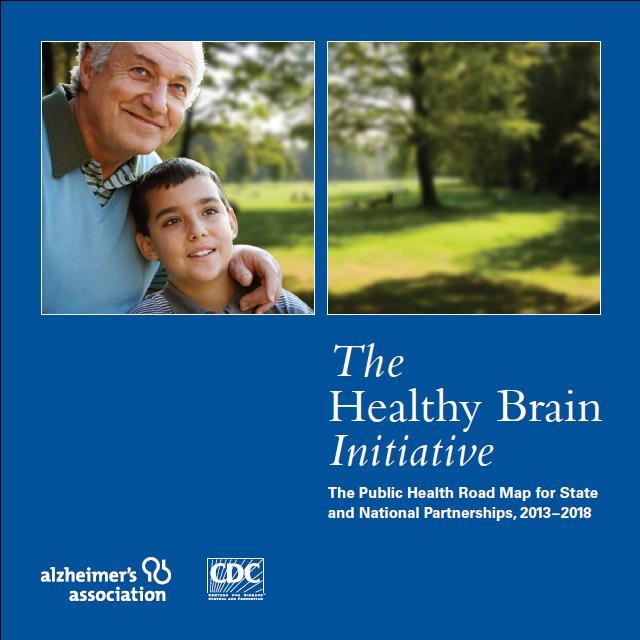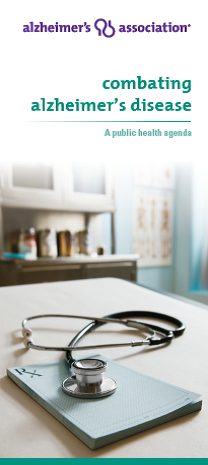Majority of Dementia Caregivers Provide Care for Sustained Period of Time
 In 2015, 59 percent of Alzheimer’s and dementia caregivers had been providing care for at least the past two years. And, that care is often intense and intimate: 64.4 percent of caregivers help with personal care like bathing and feeding, while 81.7 percent help with household activities like cleaning and managing money. These data come from a new analysis – conducted by the Centers for Disease Control and Prevention’s (CDC) Alzheimer's Disease and Healthy Aging Program – of the Caregiver Module from the 2015 Behavioral Risk Factor Surveillance System (BRFSS). In 2015, 59 percent of Alzheimer’s and dementia caregivers had been providing care for at least the past two years. And, that care is often intense and intimate: 64.4 percent of caregivers help with personal care like bathing and feeding, while 81.7 percent help with household activities like cleaning and managing money. These data come from a new analysis – conducted by the Centers for Disease Control and Prevention’s (CDC) Alzheimer's Disease and Healthy Aging Program – of the Caregiver Module from the 2015 Behavioral Risk Factor Surveillance System (BRFSS).
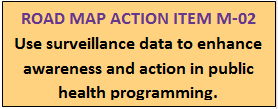 The data demonstrate just a fraction of the burden Alzheimer’s and other dementias places on caregivers. Individual fact sheets are now available for the 24 states that used the Caregiver Module in their 2015 BRFSS surveys. With these new data, states can see the scope and burden of caring for someone with Alzheimer’s and other dementias, including the toll that caregiving takes on mental and physical health. The data demonstrate just a fraction of the burden Alzheimer’s and other dementias places on caregivers. Individual fact sheets are now available for the 24 states that used the Caregiver Module in their 2015 BRFSS surveys. With these new data, states can see the scope and burden of caring for someone with Alzheimer’s and other dementias, including the toll that caregiving takes on mental and physical health.
We encourage you to download your state’s fact sheet not only for your own use, but to distribute to health officials, public health practitioners, and state policymakers. Tweet the fact sheet, link to it on your website, blog about it. Data are only useful when used to inform policy and systems change, and that can only happen if the data are widely distributed.
Reminder: Upcoming Webinar on 2015 BRFSS Data
 Be sure to join us on Thursday, March 16 from 3:00-4:00 p.m. EDT for - Long, Intensive Caregiving: Insights on Dementia Caregivers and the Public Health Response - a national briefing discussing these new findings. The webinar will feature newly released findings from 24 states’ BRFSS and is co-sponsored by the Alzheimer’s Association and AARP. Please register in advance (if prompted, use meeting number 744 304 623). Be sure to join us on Thursday, March 16 from 3:00-4:00 p.m. EDT for - Long, Intensive Caregiving: Insights on Dementia Caregivers and the Public Health Response - a national briefing discussing these new findings. The webinar will feature newly released findings from 24 states’ BRFSS and is co-sponsored by the Alzheimer’s Association and AARP. Please register in advance (if prompted, use meeting number 744 304 623).
Dr. Lisa McGuire and the team of analysts with the CDC Alzheimer’s Disease and Healthy Aging Program will discuss the BRFSS findings. Sarah Lenz Lock with Policy, Strategy, and International Affairs, AARP, and Molly French, Public Policy Division, Alzheimer’s Association will lead webinar participants in considering the implications for public health.
Dementia Caregiving is Exceptionally Burdensome
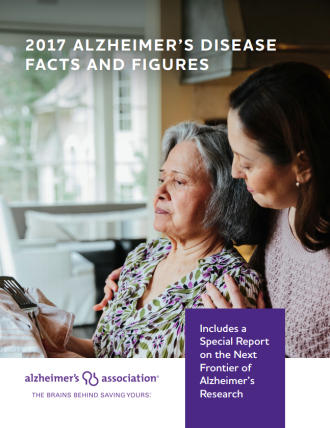 Alzheimer’s and dementia caregivers are more likely than caregivers of other older adults to assist with intimate personal care tasks such as bathing or showering (34 percent versus 23 percent) and handling incontinence or diapers (32 percent versus 12 percent). Similarly, dementia caregivers are more likely than other caregivers to help their loved ones deal with neuropsychiatric symptoms such as anxiety (41 percent versus 16 percent) and help manage behavioral issues (15 percent versus 4 percent). These findings come from the Alzheimer’s Association’s 2017 Alzheimer’s Disease Facts and Figures, our recently released annual report. Alzheimer’s and dementia caregivers are more likely than caregivers of other older adults to assist with intimate personal care tasks such as bathing or showering (34 percent versus 23 percent) and handling incontinence or diapers (32 percent versus 12 percent). Similarly, dementia caregivers are more likely than other caregivers to help their loved ones deal with neuropsychiatric symptoms such as anxiety (41 percent versus 16 percent) and help manage behavioral issues (15 percent versus 4 percent). These findings come from the Alzheimer’s Association’s 2017 Alzheimer’s Disease Facts and Figures, our recently released annual report.
In addition, caregiving for people with Alzheimer’s and other dementias negatively impacts the health of caregivers themselves. More than one-third (35 percent) of dementia caregivers say their own health has gotten worse due to their caregiving responsibilities compared with less than one-fifth (19 percent) of other caregivers. Almost half of Alzheimer’s caregivers say that providing care is highly stressful while only 35 percent of other caregivers provide the same rating.
Other findings from this year’s Facts and Figures report include:
• In 2017, Alzheimer’s costs will soar past a quarter of a trillion dollars with total annual payments for Alzheimer’s at an estimated $259 billion
• Alzheimer’s deaths have nearly doubled over the last 14 years: deaths from Alzheimer’s disease rose 89 percent between 2000 and 2014, while deaths from heart disease decreased 14 percent over the same time period
• An estimated 5.5 million people are currently living with Alzheimer’s in the United States, including 200,000 under the age of 65
• In 2016, over 15 million friends and family members provided 18.2 billion hours of unpaid care to loved ones with Alzheimer’s or another dementia - care that is valued at over $230 billion
Read the full report, download social media messaging, and view Alzheimer’s statistics specific to your state at alz.org/facts.
New and Enhanced Alzheimer’s Resources for Public Health Practitioners
More and more agencies, organizations, and individuals are beginning to tackle Alzheimer’s, recognizing it as a public health crisis. New or enhanced resources are available to help state and local public health officials address Alzheimer’s and enact change in their own communities.
NEW! Issue Brief: Reducing Potentially Preventable Hospitalizations
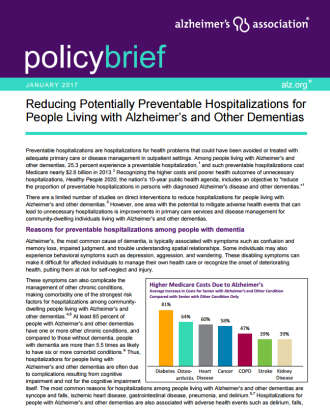 Among people living with Alzheimer’s and other dementias, 25.3 percent experience a preventable hospitalization, and such preventable hospitalizations cost Medicare nearly $2.6 billion in 2013. Hospitalizations for people with Alzheimer’s and other dementias also increase risk for delirium, falls, pressure ulcers, untreated pain, and functional decline – impacts that can hinder or delay recovery after a hospitalization, create new care challenges, or intensify the existing burden of care. A new public health policy brief from the Alzheimer’s Association – Reducing Potentially Preventable Hospitalizations for People Living with Alzheimer’s and Other Dementias – identifies ways that state and local public health leaders can help reduce potentially avoidable hospitalizations. Among people living with Alzheimer’s and other dementias, 25.3 percent experience a preventable hospitalization, and such preventable hospitalizations cost Medicare nearly $2.6 billion in 2013. Hospitalizations for people with Alzheimer’s and other dementias also increase risk for delirium, falls, pressure ulcers, untreated pain, and functional decline – impacts that can hinder or delay recovery after a hospitalization, create new care challenges, or intensify the existing burden of care. A new public health policy brief from the Alzheimer’s Association – Reducing Potentially Preventable Hospitalizations for People Living with Alzheimer’s and Other Dementias – identifies ways that state and local public health leaders can help reduce potentially avoidable hospitalizations.
NEW! Webinar: Encouraging Early Detection in Primary Care
 In this January 2017 webcast, New York State Department of Health Bureau Director David Hoffman discusses the clinical and ethical implications for cognitive impairment screening in primary care. Hoffman encourages both the primary care field and the general public to engage early in conversations about memory loss and cognitive issues. This webinar discusses the wide array of tools that primary health care providers can implement and concludes with a discussion on the ethics of cognitive screening and disclosure. Continuing education credits may be available through the University of Albany School of Public Health. In this January 2017 webcast, New York State Department of Health Bureau Director David Hoffman discusses the clinical and ethical implications for cognitive impairment screening in primary care. Hoffman encourages both the primary care field and the general public to engage early in conversations about memory loss and cognitive issues. This webinar discusses the wide array of tools that primary health care providers can implement and concludes with a discussion on the ethics of cognitive screening and disclosure. Continuing education credits may be available through the University of Albany School of Public Health.
Enhanced! Curriculum for Undergraduate Public Health Courses
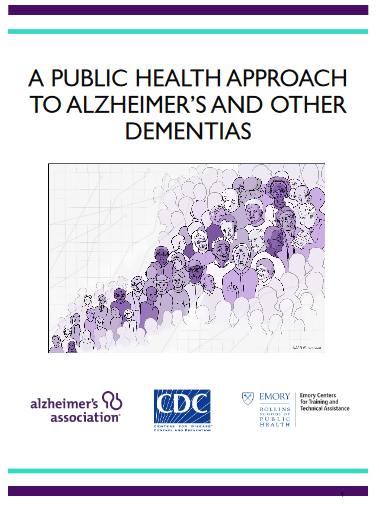 A Public Health Approach to Alzheimer’s and Other Dementias is a free new curricular resource developed by the Emory Centers for Training and Technical Assistance in the Rollins School of Public Health. The curriculum is intended for use with undergraduate public health students to introduce information about Alzheimer’s and other dementias as well as public health approaches to addressing Alzheimer’s as a multi-layered, growing public health challenge. The competency-based curriculum has four ready-to-use modules that can be used individually or as a whole and includes PowerPoint presentations, faculty guides, and additional resources to enhance learning. Faculty who piloted the curriculum in 2016 found it to be a well-designed, effective resource that was easily incorporated into the education of undergraduate public health students to help prepare them for addressing Alzheimer’s and other dementias. A Public Health Approach to Alzheimer’s and Other Dementias is a free new curricular resource developed by the Emory Centers for Training and Technical Assistance in the Rollins School of Public Health. The curriculum is intended for use with undergraduate public health students to introduce information about Alzheimer’s and other dementias as well as public health approaches to addressing Alzheimer’s as a multi-layered, growing public health challenge. The competency-based curriculum has four ready-to-use modules that can be used individually or as a whole and includes PowerPoint presentations, faculty guides, and additional resources to enhance learning. Faculty who piloted the curriculum in 2016 found it to be a well-designed, effective resource that was easily incorporated into the education of undergraduate public health students to help prepare them for addressing Alzheimer’s and other dementias.
NEW! Issue Brief: Advance Care Planning
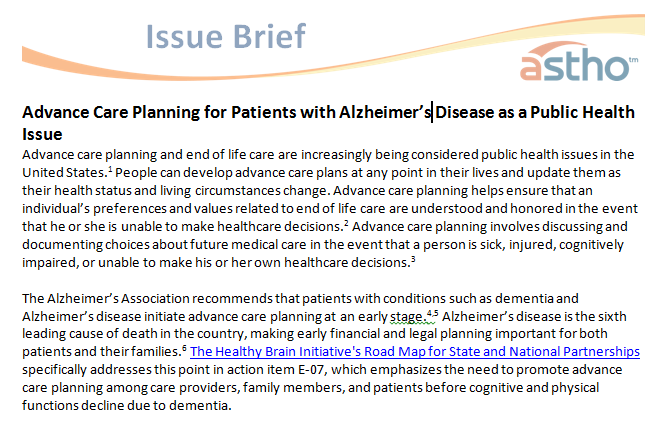 Advance care planning and end-of-life care are increasingly being considered public health issues in the United States. This month, the Association of State and Territorial Health Officials released Advance Care Planning for Alzheimer's Patients as a Public Health Issue, an issue brief that identifies the role of state health departments, public health agencies, and healthcare workforce in addressing issues related to end-of-life care and implementing programs that promote advance care planning for people with Alzheimer’s. The document outlines types of advance directives, barriers, as well as findings to date around implementation. In addition, the resource highlights state and local programs and strategies that have been used for supporting the development and implementation of ACP initiatives. Advance care planning and end-of-life care are increasingly being considered public health issues in the United States. This month, the Association of State and Territorial Health Officials released Advance Care Planning for Alzheimer's Patients as a Public Health Issue, an issue brief that identifies the role of state health departments, public health agencies, and healthcare workforce in addressing issues related to end-of-life care and implementing programs that promote advance care planning for people with Alzheimer’s. The document outlines types of advance directives, barriers, as well as findings to date around implementation. In addition, the resource highlights state and local programs and strategies that have been used for supporting the development and implementation of ACP initiatives.
NEW! PBS Documentary: Alzheimer’s: Every Minute Counts
 On January 25, PBS debuted Alzheimer’s: Every Minute Counts, an hour-long documentary discussing the social and financial implications of Alzheimer’s. The program depicts the growing national threat posed by dementia and calls for a public health approach to meet one of the most critical crises facing the country. On January 25, PBS debuted Alzheimer’s: Every Minute Counts, an hour-long documentary discussing the social and financial implications of Alzheimer’s. The program depicts the growing national threat posed by dementia and calls for a public health approach to meet one of the most critical crises facing the country.
NEW! Report: Healthy Aging in Action
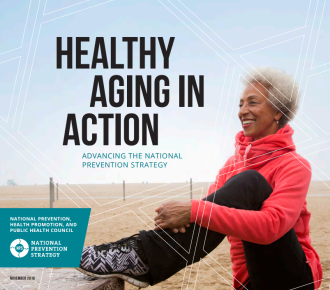 As part of a national strategy to improve health and well-being for Americans at every age, the National Prevention Council published Healthy Aging in Action – a roadmap aimed at Americans in later stages of life. The report identifies recommendations and actions to promote healthy aging, including how to enable older adults to remain active and independent; address challenges to physical, emotional, and social well-being that occur in later life; and promote cooperation across multiple sectors to enhance quality of life for older adults. As part of a national strategy to improve health and well-being for Americans at every age, the National Prevention Council published Healthy Aging in Action – a roadmap aimed at Americans in later stages of life. The report identifies recommendations and actions to promote healthy aging, including how to enable older adults to remain active and independent; address challenges to physical, emotional, and social well-being that occur in later life; and promote cooperation across multiple sectors to enhance quality of life for older adults.
NEW! Webinar: Alzheimer’s and Dementia Resources You Can Use
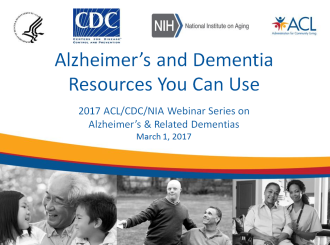 Earlier this month, a web series launched that is designed to update dementia professionals on developments in Alzheimer’s and dementia research, care, and support. The series – jointly hosted by the Centers for Disease Control and Prevention (CDC), National Institute on Aging (NIA), and the Administration for Community Living (ACL) – kicked off with a webinar on new resources for consumers, caregivers, and professionals with a special emphasis on veterans, financial exploitation, and depression. Learn more and download the presentation materials. Earlier this month, a web series launched that is designed to update dementia professionals on developments in Alzheimer’s and dementia research, care, and support. The series – jointly hosted by the Centers for Disease Control and Prevention (CDC), National Institute on Aging (NIA), and the Administration for Community Living (ACL) – kicked off with a webinar on new resources for consumers, caregivers, and professionals with a special emphasis on veterans, financial exploitation, and depression. Learn more and download the presentation materials.
NEW! Upcoming Awareness Event: Memory Sunday
 On Sunday, June 11, 2017, the Balm in Gilead and its partners will host Memory Sunday events across the country. Working within faith communities, Memory Sunday aims to draw national and local attention to the burden of Alzheimer’s on the African American community, educate local parishioners about Alzheimer’s, encourage participation in clinical trials, and support caregivers. On Sunday, June 11, 2017, the Balm in Gilead and its partners will host Memory Sunday events across the country. Working within faith communities, Memory Sunday aims to draw national and local attention to the burden of Alzheimer’s on the African American community, educate local parishioners about Alzheimer’s, encourage participation in clinical trials, and support caregivers.
The Alzheimer’s Public Health E-News is supported by Cooperative Agreement #NU58DP006115-02 from the Centers for Disease Control and Prevention (CDC). Its contents are solely the responsibility of the Alzheimer’s Association and do not necessarily represent the official views of the CDC.
For subscription services or to view previous issues of Alzheimer’s Public Health News, please visit http://alz.org/publichealth/public-health-news.asp or contact John Shean (jshean@alz.org).
|
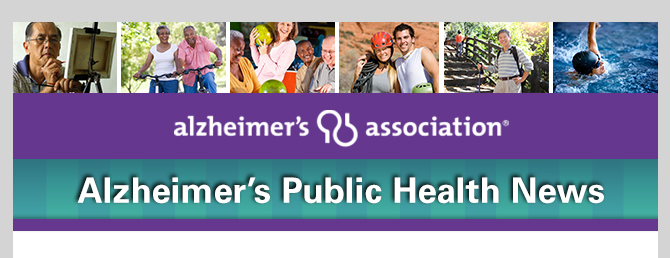


 The data demonstrate just a fraction of the burden Alzheimer’s and other dementias places on caregivers. Individual
The data demonstrate just a fraction of the burden Alzheimer’s and other dementias places on caregivers. Individual 








